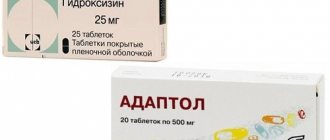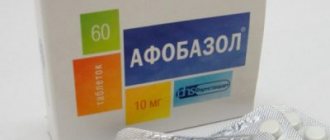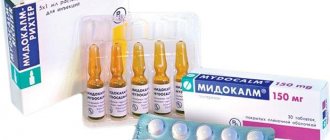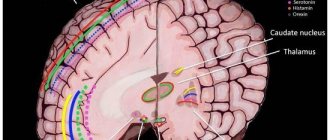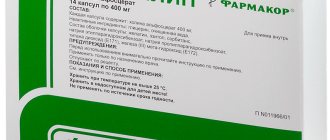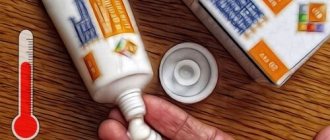Created: 04/17/2019
Updated: 01/28/2021 23:11:54 Share:
Two anxiolytic drugs are presented to your attention - Mebicar and Adaptol. The same composition, dosage, principle of action and indications - what is the difference between them? Both drugs are prescribed in the complex treatment of neuroses, cardiac diseases, addiction to tobacco and in other situations to relieve fear and anxiety. At first glance, the drugs differ only in price, and Mebikar, as a cheaper drug, is the winner. But is it really that simple?
The experts of our magazine collected data on the drugs in question and found out that Adaptol is considered an original drug, while Mebicar is a generic. The original has undergone clinical trials and has established itself as a medicine effective in the treatment of various neurological conditions. The generic differs in its auxiliary components and, theoretically, its effectiveness may be lower.
Studies have shown that both drugs cope with the task and are equally often used in practice. It is safe to say that in this case, the generic Mebicar is practically not inferior to the original Adaptol and can successfully compete with it in the pharmaceutical market.
Composition and release form: is there a difference?
The main active ingredient is the same for Adaptol and Mebicar - tetramethyltetraazabicyclooctanedione. The drugs in question differ in their auxiliary components. Mebicar additionally contains povidone and calcium stearate, Adaptol contains the same calcium stearate and methylcellulose.
Both drugs belong to the same pharmacological group. These are anxiolytics, they are also tranquilizers - drugs that relieve anxiety and fear. They are used in practical psychiatry and neurology, and are used in therapy for the complex treatment of certain diseases.
Mebicar and Adaptol are available in tablets. The dosage of the drug differs:
- Adaptol is presented on the pharmaceutical market in the form of 500 mg tablets.
- Mebicar is available in tablets of 300 and 500 mg.
The cost of drugs varies:
- Adaptol - about 600 rubles for 20 pieces.
- Mebicar - about 400 rubles for 20 pieces.
Mebicar is one and a half times cheaper, which determines its popularity. But let's find out whether the price of the more expensive option - Adaptol - is justified, and whether it is worth saving in this case.
Cheap analogues and substitutes for the drug adaptol: list with prices
Most often, when studying the global pharmaceutical market, Ukrainian-made drugs turn out to be the cheapest, but upon closer study it becomes clear that the price range is as great as in other countries.
Cheap analogues of the drug:
- Mebikar, a drug with the same name as that of Russian manufacturers, but the price starts from 190 rubles. The same list of indications: nervous excitability, irritability, neuropsychic disorders.
- Tranquilar - its price is higher: 500-600 rubles. The composition contains similar substitutes that affect the restoration of the nervous system, eliminating unreasonable anxieties, fears and excessive irritability.
- NOOBUT-IC. Made with phenibut. Suitable for children from three years old. Costs about 550 rubles. Used for severe cases of alcohol syndrome.
- Glyceside. The Ukrainian-made drug is cheaper, costs about 70-100 rubles. Has a slight sedative effect. Gently soothes, brings the general condition back to normal.
How do they work?
The instructions for use state that tetramethyltetraazabicyclooctanedione in Adaptol and Mebicar acts on various tissues:
- enhances oxygen supply to the myocardium;
- improves blood flow in the heart muscle;
- normalizes the balance of electrolytes in the blood;
- activates protein synthesis;
- increases the energy resource of the cell.
The active substance of both drugs is similar in structure to natural metabolites of the human body. It affects the functioning of the hypothalamus and the main neurotransmitter systems. The drugs under study are involved in the synthesis of choline, serotonin and adrenaline. When applied as a course, the following effects are expected:
- anxiety and restlessness go away;
- the feeling of fear decreases;
- emotional stress decreases;
- Cognitive functions improve: attention, memory.
Adaptol and Mebicar do not reduce mental and motor activity, so they can be prescribed during the day (including during school and work). They do not cause drowsiness, but improve the natural flow of sleep if it is disturbed. They do not lead to the development of euphoria and do not affect mood. Ease nicotine addiction.
Reviews from patients who took the drug
Sergey, 29 years old, Tomsk
I suffer from myopathy. The doctor prescribed Adaptol. I used 2 packages of the drug (500 mg, 20 tablets) per course of treatment. Irritability disappeared, I became calm, my sleep was normal. I am satisfied with the treatment. In 2 months I want to repeat the course of therapy.
Alexander, 68 years old, Orel
I was worried at a friend's funeral. Blood pressure increased and anxious thoughts appeared in my head. The doctor prescribed Mebicar. I took the medicine for 30 days, 3 tablets per day. A week later, my blood pressure stabilized, my general condition improved, and I felt peace of mind.
Ekaterina, 35 years old, Ryazan
I suffer from VSD. I took Mebicar for 14 days, 1 tablet 4 times a day. I felt improvement on the 3rd day. After the course of therapy, I began to sleep soundly, and my mental discomfort disappeared. There were no side effects. A good sedative. I recommend.
After the birth of the child, I fell into some kind of depressive state. It persisted for a long time, so I was forced to turn to a specialist. He prescribed me a two-month course of Mebicar tablets.
I took a tablet in the morning and in the evening. The doctor warned that the drug has a cumulative effect, that is, it takes time to feel a positive result. I began to notice changes after 5-6 days. My mood improved significantly, the negative thoughts that tormented me were replaced by a positive attitude towards life. After completing a full course of therapy, I was finally able to fully enjoy my new role as a mother.
Separately, I would like to note that I took the pills while breastfeeding my baby. The therapy was carried out under the supervision of a specialist; no pathologies or deterioration in the child’s condition were identified.
With the help of Mebikar, he struggled with his long-term addiction to smoking. I decided to get rid of the addiction on my own after the doctor discovered that I had heart problems.
Quitting smoking was not accompanied by any special means; it depended only on willpower and the desire for a healthy lifestyle. However, I regularly felt the urge to smoke a cigarette.
As a result, I turned to a neurologist and talked about my problem. The specialist recommended that I take Mebicar tablets for three months. Initially, I did not feel any changes, but gradually the craving for smoking began to disappear. The nervousness and irritability associated with quitting smoking were eliminated. My head became clear and I felt like a new person.
A couple of years have passed since then; during this period I have not smoked a single cigarette. An excellent result, certainly achieved with the help of Mebikar.
Due to problems at work, serious problems with nerves began. Various phobias, nervousness, anger, and aggressiveness became my constant companions. A neurologist diagnosed me with a severe neurotic disorder.
As therapy, I was prescribed Mebicar tablets. I drank them for quite a long time, almost 5 months. The treatment was accompanied by periodic intestinal disorders and pressure surges. But the drug managed to cope with my main problem.
In general, reviews about Mebicare are positive. Experts note that adverse reactions were observed in no more than 20% of patients. In 98% of cases, therapy has a positive result.
Veronica, 28 years old, Chelyabinsk: After the birth of her child, she fell into some kind of depressive state. It persisted for a long time, so I was forced to turn to a specialist. He prescribed me a two-month course of Mebicar tablets.
Separately, I would like to note that I took the pills while breastfeeding my baby. The therapy was carried out under the supervision of a specialist; no pathologies or deterioration in the child’s condition were identified.
Mebikar tablets are a group of tranquilizers that help eliminate emotional stress, restlessness, anxiety, fear, and excessive irritability.
The active component of the drug is tetramethyltetraazabicyclooctanedione, also called mebicar for short. The structure of the synthetic active component is similar to the structure of natural mebicar produced in the human body. The substance acts on the brain centers responsible for regulating emotions and behavioral reactions.
The drug does not accumulate in the body and is excreted by the kidneys; no drug dependence on Mebicar has been observed.
Assessing the effectiveness of drugs
Controversy among doctors continues regarding Adaptol and Mebicar. Old-school specialists say that these drugs have proven their effectiveness in clinical practice. Neurologists and psychiatrists prescribe these drugs - and see their positive effects. The beneficial effects of medications are confirmed by clinical trials:
- Mebicar has proven itself in the treatment of anxiety disorders associated with autonomic dysfunction. Studies have shown that the drug relieves feelings of anxiety and fear without causing drowsiness or reducing memory and attention.
- Adaptol has been used in complex therapy of irritable bowel syndrome. The effect was noticeable already in the second week of taking the drug. The study authors especially emphasized the fact that Adaptol reduces anxiety and eliminates autonomic disorders without causing significant side effects.
- Both drugs are successfully used in neurological and psychiatric practice, in dermatology, which is confirmed by numerous scientific works.
- There are many similar examples, and these drugs are popular in Russia and the former CIS countries. But what do foreign colleagues say about this? A review of Cochrane studies did not provide information on the effectiveness of Adaptol (Mebicar). There is only data on not very large-scale studies that showed the beneficial effects of Adaptol, but you can’t focus on them alone. The sample is too small to seriously talk about the effectiveness of the drug.
- Some sources refer to Adaptol and its analogues as “fuflomycins,” emphasizing the fact that these drugs have not undergone randomized clinical trials. According to the position of evidence-based medicine, such drugs cannot be used in the practice of a modern doctor.
Adaptol is a worthy analogue of Mebicar
The drug is produced in Latvia. It has several forms: capsules, tablets. The main active substance that determines the action of the drug is mebicar . In different forms, 300 or 500 mg of the main substance is found.
Adaptol is classified as a psycholeptic and other ankyolytic. Being a tranquilizer, it helps patients get rid of attacks of fear, anxiety, and concern, completely or partially.
Gradually calms the person, without causing inhibition or impaired coordination of movement. Therefore, it is effectively used during training and during work that requires mental stress.
A person feels natural without a sharp increase in mood and a feeling of euphoria.
Adaptol is not a hypnotic substance, but it harmonizes perfectly with sleeping pills, enhancing their effect. In this case, sleep becomes better quality.
The nootropic effect of the drug improves memory and concentration. Increases mental performance . In this case, there are no symptoms of psychopathological disorders: psychoemotional activity, delirium.
Reduces nicotine addiction.
The drug is characterized by high bioavailability - 80% . Already half an hour after oral administration, its effect on the body begins. Lasts up to 4 hours. It is not metabolized, does not accumulate, but is completely excreted in the urine.
It is not a toxic substance, so cases of overdose are extremely rare.
Indications for use
Indications for Mebicar and Adaptol are similar:
- neurotic disorders: anxiety, phobia, depression, emotional lability, etc.;
- complex therapy for cardialgia (heart pain), coronary heart disease;
- recovery after myocardial infarction;
- addiction to tobacco – to reduce craving for nicotine;
- when prescribing antipsychotics and tranquilizers - to improve their tolerability.
- Indications for therapy are determined by the doctor after examination.
Characteristics of Mebikar
It is an anxiolytic drug that is characterized by anticonvulsant activity. Available in tablet form. The main component is mebicar. The drug has stress-protective, nootropic and anxiolytic effects. Thanks to it, myocardial tissue is better supplied with oxygen, the energy reserve of cells increases, the level of potassium ions in the blood plasma is normalized, and disturbances in the electrolyte balance of the blood are eliminated.
In addition, the drug helps combat nighttime sleep disorders without having a hypnotic effect. This drug does not have a cholinolytic or muscle relaxant effect. The main component helps alleviate or completely eliminate the manifestations of nicotine addiction.
Indications for use:
- neurotic disorders that arose under the influence of psycho-emotional and neuropsychic stress: anxiety, anxious-depressive, panic attacks, phobias;
- smoking (to reduce desire);
- neurosis-like states in alcoholism (the purpose of taking the drug is to reduce the pathological craving for alcohol, eliminate irritability, improve mood);
- coronary heart disease, cardialgia.
In addition, the drug is prescribed to patients undergoing treatment with antipsychotics and tranquilizers. Mebicar is contraindicated in the first trimester of pregnancy and in case of excessive sensitivity to the components of the drug.
Taking the medication leads to the development of the following effects:
- dyspeptic disorders;
- slight increase in body temperature;
- slight decrease in pressure;
- allergy.
Mebicar is prescribed for coronary heart disease and cardialgia.
In case of overdose, the severity of side effects increases. In this case, the stomach is washed and further detoxification therapy is carried out. The drug is not recommended for use by people whose activities require increased concentration.
How are they transferred?
Experience shows that anxiolytics are well tolerated and side effects are rare. The following conditions may occur:
- allergic reaction such as skin itching and rash;
- decreased blood pressure;
- increased body temperature;
- nausea, abdominal discomfort.
These reactions are not a reason to stop therapy. Usually blood pressure and body temperature return to normal on their own. Only if an allergic rash and abdominal pain appears should you stop taking the drug and consult a doctor.
During treatment there is no addiction. Cancellation is well tolerated and no dosage adjustment is required.
Consequences
Adaptol has low toxicity and is usually well tolerated. Allergic manifestations and digestive disorders are possible after consuming large doses. In this case, you should stop taking the drug. In case of intoxication, perform a gastric lavage procedure. There may be a decrease in blood pressure and body temperature, which normalize on their own and do not require stopping the drug. The medicine may cause a bitter taste in the mouth and dizziness in the first week of taking it.
Adaptol has not been tested on pregnant women, so in this situation it is better to consult a doctor rather than self-medicate.
Adaptol is a rather weak drug; it is unlikely to help with severe psychoneurological disorders. In such cases, a more serious, comprehensive examination under the supervision of specialists is necessary.
The drug helps improve brain function. It is prescribed for excitability, nervous and stress disorders.
The success of the drug’s effectiveness solely depends on the symptoms and stage of the vegetative-vascular or other disease. It is quite expected that at a severe stage of the development of the disease, the patient will need a stronger group of medications.
Precautionary measures
Adaptol and Mebicar are not prescribed in the following situations:
- pregnancy;
- lactation period;
- children under 18 years of age;
- individual intolerance to the drug.
The drugs are low-toxic, and overdose is unlikely. Exceeding the dosage can lead to a sharp decrease in blood pressure, weakness and attacks of dizziness. When such symptoms appear, gastric lavage is indicated.
Interaction
The effectiveness of Mebicar is quite similar to Adaptol - this means that the ability of the drug substance to provide the maximum possible effect is similar.
For example, if the therapeutic effect of Mebicar is more pronounced, then using Adaptol even in large doses will not achieve this effect.
Also, the speed of therapy - an indicator of the speed of therapeutic action - is approximately the same for Mebicar and Adaptol. And bioavailability, that is, the amount of a drug reaching its site of action in the body, is similar. The higher the bioavailability, the less it will be lost during absorption and use by the body.
Side effects during treatment with Adaptol are rare in patients. Sometimes allergic manifestations are observed. When using high doses of the drug, the patient may experience dyspeptic disorders. In this case, treatment is suspended. In very rare cases, hypotension and hypothermia may occur. As a rule, these phenomena go away on their own.
Synonyms of nosological groups
| Category ICD-10 | Synonyms of diseases according to ICD-10 |
| F10.1 Harmful use of alcohol | Dipsomania |
| Binge drinking | |
| Drunken state | |
| Alcohol abuse | |
| Excessive alcohol consumption | |
| Quarterly binge | |
| Obsessive craving for alcohol | |
| Pathological craving for alcohol | |
| F10.2 Alcohol dependence syndrome | Alcoholism |
| Alcohol addiction | |
| Dipsomania | |
| Alcohol addiction | |
| Binge drinking | |
| Drunken state | |
| Alcohol abuse | |
| Ideation disorder in alcoholism | |
| Quarterly binge | |
| Obsessive craving for alcohol | |
| Neurotic symptoms in alcoholism | |
| Pathological craving for alcohol | |
| Psychoorganic syndrome in chronic alcoholism | |
| Reduced craving for alcohol | |
| Chronic alcoholism | |
| F17.1 Harmful use of tobacco | Nicotine abuse |
| F17.2 Nicotine dependence | Withdrawal syndrome when quitting smoking |
| Craving for smoking tobacco | |
| Nicotine abuse | |
| Tobacco addiction | |
| Craving for smoking | |
| F19 Mental and behavioral disorders caused by the simultaneous use of several drugs and the use of other psychoactive substances | Psychological and physiological dependence on psychoactive substances |
| F40 Phobic anxiety disorders | Obsessive fears |
| Anxiety neurosis | |
| Anxiety neurosis | |
| Night terrors | |
| Acute anxiety disorder | |
| Paroxysmal fear syndrome | |
| State of fear | |
| Fear | |
| Phobias | |
| Phobic disorders | |
| Phobia | |
| Feeling of fear | |
| F41 Other anxiety disorders | Relief of anxiety |
| Non-psychotic anxiety disorders | |
| Alarm state | |
| Anxiety | |
| Anxious and suspicious states | |
| Chronic anxiety | |
| Sense of anxiety | |
| F41.2 Mixed anxiety and depressive disorder | Depression with anxiety-depressive components |
| Mixed anxiety and depression | |
| Anxious depression | |
| Anxious-depressive mood | |
| Anxiety and depression | |
| Anxiety and depression | |
| Anxiety-depressive syndrome | |
| Anxiety-neurotic conditions | |
| F41.9 Anxiety disorder, unspecified | Severe anxiety |
| Neurosis-like symptoms | |
| Neurosis-like disorders | |
| Neurosis-like conditions | |
| Neuroses with anxiety symptoms | |
| Neuroses with anxiety | |
| Neurotic disorders with anxiety syndrome | |
| Acute situational and stress anxiety | |
| Acute situational stress anxiety | |
| Acute anxiety attack | |
| Depressed mood with elements of anxiety | |
| Psychopathy with a predominance of anxiety and restlessness | |
| Sharp anxiety | |
| Situational anxiety disorder | |
| Alarm state | |
| Susto | |
| Anxious delusional state | |
| Anxious delusional component | |
| Anxious state | |
| Anxiety | |
| Anxiety neuroses | |
| Anxiety disorders | |
| Anxiety disorders in neurotic and neurosis-like conditions | |
| Anxiety states | |
| Anxiety syndrome | |
| Chronic neurotic anxiety | |
| Sense of anxiety | |
| F48.9 Neurotic disorder, unspecified | Secondary neurotic symptom |
| Other neurotic conditions | |
| Neurosis | |
| Neurosis with increased irritability | |
| Neuroses | |
| Neuroses of all kinds | |
| Neuroses with retardation | |
| Neuroses of the heart | |
| Neurotic disorders in alcoholism | |
| Neurotic disorders with retardation | |
| Neurotic disorders with anxiety syndrome | |
| Neurotic reactions | |
| Neurotic symptoms in alcoholism | |
| Neurotic conditions | |
| Neurotic syndrome | |
| Neurotic disorder | |
| Attack of neurological dysfunction | |
| School neurosis | |
| Emotional stress | |
| F60.3 Emotionally unstable personality disorder | Mood changes |
| Mood variability | |
| Mood lability | |
| Mood disorder | |
| Mood disorders | |
| Instability of the emotional background | |
| Mood swings | |
| Mental lability | |
| Mood disorders | |
| Mixed emotional disorders | |
| Decreased mood | |
| State of emotional tension | |
| Worsening mood | |
| Emotional lability | |
| Emotional tension | |
| Emotional instability | |
| Emotional instability | |
| Emotional withdrawal | |
| Emotional detachment | |
| I25.2 Previous myocardial infarction | Cardiac syndrome |
| Previous myocardial infarction | |
| Post-infarction cardiosclerosis | |
| Post-infarction period | |
| Rehabilitation after myocardial infarction | |
| Reocclusion of the operated vessel | |
| Condition after myocardial infarction | |
| Condition after myocardial infarction | |
| Angina pectoris post-infarction | |
| I25.9 Chronic ischemic heart disease, unspecified | IHD |
| Coronary atherosclerosis in patients with coronary artery disease | |
| Coronary circulatory insufficiency | |
| R07.2 Pain in the heart area | Pain syndrome during myocardial infarction |
| Pain in cardiac patients | |
| Cardialgia | |
| Cardialgia against the background of dyshormonal myocardial dystrophy | |
| Cardiac syndrome | |
| Cardioneurosis | |
| Myocardial ischemic pain | |
| Neuroses of the heart | |
| Pericardial pain | |
| Pseudoangina | |
| Functional cardialgia | |
| R45.4 Irritability and anger | Outbursts of anger |
| Anger | |
| Dysphoria | |
| Neurosis with increased irritability | |
| Bitterness | |
| Increased irritability | |
| Increased irritability of the nervous system | |
| Irritability | |
| Irritability with neuroses | |
| Irritability in psychopathic disorders | |
| Symptoms of irritability | |
| R53 Malaise and fatigue | Asthenic disorders |
| Asthenic conditions | |
| Asthenic phenomena | |
| Asthenic syndrome | |
| Asthenic disorder | |
| Asthenic condition | |
| Asthenic phenomenon | |
| Asthenia | |
| Astheno-adynamic subdepressive states | |
| Astheno-vegetative symptoms | |
| Astheno-vegetative disorder | |
| Astheno-depressive disorder | |
| Astheno-depressive state | |
| Astheno-neurotic condition | |
| Asthenovegetative symptoms | |
| Asthenodepressive disorder | |
| Asthenodepressive state | |
| Asthenoneurotic disorder | |
| Fast fatiguability | |
| Flu of young workaholics | |
| Yuppie flu | |
| Diabetic asthenia | |
| Exhaustion of the nervous system | |
| Physical exhaustion | |
| Malaise | |
| Nervous exhaustion with depression | |
| General mental fatigue | |
| General physical fatigue | |
| General malaise | |
| Pathological fatigue | |
| Increased fatigue | |
| Increased fatigue | |
| Mental fatigue | |
| Mental exhaustion | |
| Mental fatigue | |
| Asthenovegetative syndrome | |
| Chronic fatigue syndrome | |
| Decreased overall activity | |
| State of increased fatigue | |
| Conditions of increased fatigue | |
| Mental fatigue | |
| Prostration | |
| Fatigue | |
| Fatigue | |
| Fatigue | |
| Physical fatigue | |
| Physical and mental fatigue | |
| Physical fatigue | |
| Functional asthenic conditions | |
| Chronic fatigue | |
| Chronic asthenic conditions | |
| Z73.2 Lack of rest and relaxation | High mental stress |
| General weakness | |
| Mental fatigue | |
| State of fatigue |
4 years.
Instructions for Adaptol (Method and dosage)
The instructions for Adaptol stipulate that the tablets can be taken regardless of the meal period. As a rule, patients are prescribed from 300 mg to 500 mg of the drug 2-3 times a day. The drug is prescribed for a period of 2 days to 3 months, depending on the diagnosis and characteristics of the course of the disease.
Inside, regardless of food intake.
0.3–0.9 g 2–3 times a day.
The maximum single dose is 3 g, the daily dose is 10 g. The course for prevention and treatment is from several days to 2-3 months, depending on the situation, for mental illness - up to 6 months.
Possible negative reactions
Therapy with Adaptol (even at the initial stage and in minimal doses) may be accompanied by the following adverse reactions:
- allergies due to individual intolerance of the body to the components of the drug;
- dyspeptic symptoms;
- a sharp decrease in blood pressure;
- decrease in body temperature.
If an allergic reaction and/or dyspeptic symptoms develop, Adaptol therapy should be stopped immediately.
Prescription restrictions
It is prohibited to prescribe tablets if you have an individual intolerance to the components of the composition, as well as in the first trimester of pregnancy.
https://www.youtube.com/watch?v=hgI1wvPRmI8
At the discretion of the doctor, a tranquilizer can be prescribed to pregnant women from the second trimester.
It is important to note that the effect of Mebicar on the child’s body (including newborns) has not been fully determined, so the tranquilizer should be prescribed with caution and only under the supervision of a doctor. We are talking about both younger patients and women during lactation who are breastfeeding newborns.
